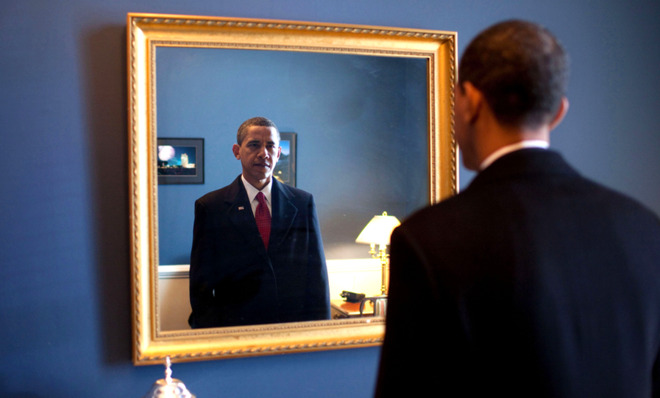It takes one to tango: Why Obama's government by executive action is here to stay
The new EPA rules are a template for how Democrats can govern in an era of extreme polarization


A free daily email with the biggest news stories of the day – and the best features from TheWeek.com
You are now subscribed
Your newsletter sign-up was successful
When President Obama spoke about climate change in his 2013 State of the Union address, he declared, "If Congress won't act soon to protect future generations, I will." On Monday, he followed through on that promise, unveiling a bold proposed rule for the Environmental Protection Agency to reduce carbon emissions from existing power plants by 30 percent before 2030. And he did it without any action from Congress.
The administration's unilateral maneuver triggered predictable howls about lawlessness and overreach, including from Senate Minority Leader Mitch McConnell (R-Ky.). But despite conservative furor, our current political conditions suggest that we're likely to see more executive action around a sidelined Congress — going into 2016 and beyond.
First, the two parties remain polarized at unprecedented levels. They are ideologically cohesive, with the most liberal Republican falling to the right of the most conservative Democrat.
The Week
Escape your echo chamber. Get the facts behind the news, plus analysis from multiple perspectives.

Sign up for The Week's Free Newsletters
From our morning news briefing to a weekly Good News Newsletter, get the best of The Week delivered directly to your inbox.
From our morning news briefing to a weekly Good News Newsletter, get the best of The Week delivered directly to your inbox.
Second, divided government will likely persist. We have two radically different electorates in the United States: A more conservative midterm electorate and a more liberal presidential electorate. Democrats may have structural advantages in the Electoral College, but their coalition does not turn out to vote in midterms. This dynamic will generally produce a Democrat in the White House squaring off against a Republican-led Congress.
Third, a more conservative GOP will continue to see electoral incentives in near-total obstruction. The McConnell Doctrine — "the single most important thing we want to achieve is for President Obama to be a one-term president" — will continue to frustrate most legislation that might win public approval for a Democratic president. When our parties are ideologically distinct, this reflex is an intrinsic feature of our democracy, not an aberration.
All of which is a recipe for legislative paralysis. But a Democratic president who believes in active government won't accept a sunken policy agenda at the hands of a deadbeat Congress. He or she will undoubtedly explore creative avenues to achieve policy goals through pre-existing statutory mandates — precisely what Obama and the EPA did here, through the Clean Air Act of 1970.
We've seen this play out before: Congress fails to act, so President Obama acts on his own. When the DREAM Act languished in Congress, Obama unilaterally launched a deferred action program for young undocumented immigrants to protect them from deportation.
A free daily email with the biggest news stories of the day – and the best features from TheWeek.com
When the legislative process broke down around health care, agencies relied on executive discretion to improve ObamaCare's rough edges. Congressional Republicans had no interest in taking even small steps to make the law better, so executive agencies had to stake out tenuous legal grounds to repeatedly delay the problematic employer mandate and to make premium subsidies available in all states.
Where might we see unilateral action from the president next? Maybe on immigration, where Obama has held a deportation review over the heads of congressional Republicans, suggesting that he could expand deferred action on his own if Congress doesn't pass comprehensive reform. He has now delayed this review to give Congress one last chance to act.
Government by executive action isn't necessarily a bad thing. Executive agencies are experts in their fields in ways that Congress emphatically is not, so we might get better-crafted policies out of agencies than we would from Congress.
But relying solely on agencies is hardly ideal. They can only achieve so much absent new congressional authority. While the president can defer deportations, he can't provide a path to citizenship. Nor can he give his carbon reduction goals the permanence of law. Only Congress can do that.
Stretching the bounds of the law also invites burdensome legal challenges. As Harvard Law School professor Jody Freeman wrote in the New York Times, it's hard to teach an old law new tricks. The new EPA rule will be bogged down by legal challenges for years.
But that's what our democracy has come to. "This," Freeman writes, "is how policy is made when Congress abdicates its role." With Congress in paralysis, it becomes a two-branch game of executive action and judicial review.
The irony is that the Republican obstructionism at the heart of this paralysis only serves to concentrate more power in the White House. After all, someone has to govern.
Maybe congressional Republicans will realize this and rejoin democratic governance. Our democracy would be much better for it. But it's all too easy to hear Mitch McConnell, three years from now, intoning, "The single most important thing we want to achieve is for President Clinton to be a one-term president."
Joel Dodge writes about politics, law, and domestic policy for The Week and at his blog. He is a member of the Boston University School of Law's class of 2014.
-
 Nuuk becomes ground zero for Greenland’s diplomatic straits
Nuuk becomes ground zero for Greenland’s diplomatic straitsIN THE SPOTLIGHT A flurry of new consular activity in the remote Danish protectorate shows how important Greenland has become to Europeans’ anxiety about American imperialism
-
 ‘This is something that happens all too often’
‘This is something that happens all too often’Instant Opinion Opinion, comment and editorials of the day
-
 House votes to end Trump’s Canada tariffs
House votes to end Trump’s Canada tariffsSpeed Read Six Republicans joined with Democrats to repeal the president’s tariffs
-
 The billionaires’ wealth tax: a catastrophe for California?
The billionaires’ wealth tax: a catastrophe for California?Talking Point Peter Thiel and Larry Page preparing to change state residency
-
 Bari Weiss’ ‘60 Minutes’ scandal is about more than one report
Bari Weiss’ ‘60 Minutes’ scandal is about more than one reportIN THE SPOTLIGHT By blocking an approved segment on a controversial prison holding US deportees in El Salvador, the editor-in-chief of CBS News has become the main story
-
 Has Zohran Mamdani shown the Democrats how to win again?
Has Zohran Mamdani shown the Democrats how to win again?Today’s Big Question New York City mayoral election touted as victory for left-wing populists but moderate centrist wins elsewhere present more complex path for Democratic Party
-
 Millions turn out for anti-Trump ‘No Kings’ rallies
Millions turn out for anti-Trump ‘No Kings’ ralliesSpeed Read An estimated 7 million people participated, 2 million more than at the first ‘No Kings’ protest in June
-
 Ghislaine Maxwell: angling for a Trump pardon
Ghislaine Maxwell: angling for a Trump pardonTalking Point Convicted sex trafficker's testimony could shed new light on president's links to Jeffrey Epstein
-
 The last words and final moments of 40 presidents
The last words and final moments of 40 presidentsThe Explainer Some are eloquent quotes worthy of the holders of the highest office in the nation, and others... aren't
-
 The JFK files: the truth at last?
The JFK files: the truth at last?In The Spotlight More than 64,000 previously classified documents relating the 1963 assassination of John F. Kennedy have been released by the Trump administration
-
 'Seriously, not literally': how should the world take Donald Trump?
'Seriously, not literally': how should the world take Donald Trump?Today's big question White House rhetoric and reality look likely to become increasingly blurred
